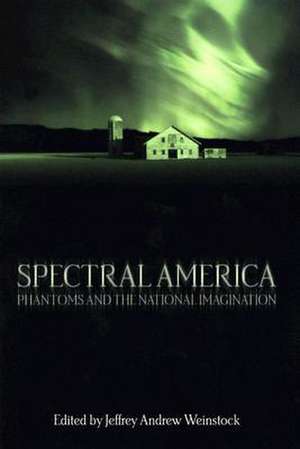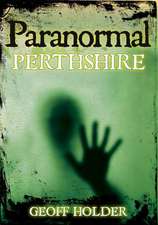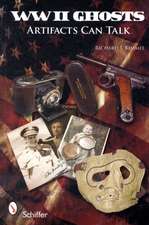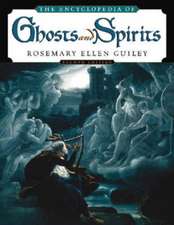Spectral America: Phantoms and the National Imagination: A Ray and Pat Browne Book
Autor Jeffrey Andrew Weinstocken Limba Engleză Paperback – 29 iun 2004
Spectral America asserts that ghosts, whether in oral tradition, literature, or such modern forms as cinema have always been constructions embedded in specific historical contexts and invoked for explicit purposes, often political in nature. The essays address the role of "spectral evidence" during the Salem witch trials, the Puritan belief in good spirits, the convergence of American Spiritualism and technological development in the nineteenth century, the use of the supernatural as a tool of political critique in twentieth-century magic realism, and the "ghosting" of persons living with AIDS. They also discuss ghostly themes in the work of Ambrose Bierce, Edith Wharton, Gloria Naylor, and Stephen King.
| Toate formatele și edițiile | Preț | Express |
|---|---|---|
| Paperback (1) | 119.30 lei 22-36 zile | |
| University of Wisconsin Press – 29 iun 2004 | 119.30 lei 22-36 zile | |
| Hardback (1) | 381.37 lei 22-36 zile | |
| University of Wisconsin Press – 29 iun 2004 | 381.37 lei 22-36 zile |
Preț: 119.30 lei
Nou
Puncte Express: 179
Preț estimativ în valută:
22.83€ • 23.89$ • 19.00£
22.83€ • 23.89$ • 19.00£
Carte disponibilă
Livrare economică 10-24 martie
Preluare comenzi: 021 569.72.76
Specificații
ISBN-13: 9780299199548
ISBN-10: 0299199541
Pagini: 280
Dimensiuni: 152 x 229 x 18 mm
Greutate: 0.4 kg
Ediția:1
Editura: University of Wisconsin Press
Colecția Popular Press 3
Seria A Ray and Pat Browne Book
ISBN-10: 0299199541
Pagini: 280
Dimensiuni: 152 x 229 x 18 mm
Greutate: 0.4 kg
Ediția:1
Editura: University of Wisconsin Press
Colecția Popular Press 3
Seria A Ray and Pat Browne Book
Recenzii
"Ghosts are a booming industry, and this eclectic and engaging collection of studies, both literary and historical, addresses America’s relationship to the spectral."—Lynette Carpenter, Ohio Wesleyan University, editor of Haunting the House of Fiction
"I know of no other book currently in print that explores with the same level of intellectual and critical seriousness the scope of spectral phenomena covered in this collection."—Tony Magistrale, University of Vermont, author of Poe’s Children
"I know of no other book currently in print that explores with the same level of intellectual and critical seriousness the scope of spectral phenomena covered in this collection."—Tony Magistrale, University of Vermont, author of Poe’s Children
Notă biografică
Jeffrey Weinstock is assistant professor of English at Central Michigan University. He is the editor of The Pedagogical Wallpaper and coeditor, with Sarah Lynn Higley, of Nothing That Is: Millennial Cinema and The Blair Witch Controversies.
Descriere
From essays about the Salem witch trials to literary uses of ghosts by Twain, Wharton, and Bierce to the cinematic blockbuster The Sixth Sense, this book is the first to survey the importance of ghosts and hauntings in American culture across time. From the Puritans’ conviction that a thousand preternatural beings appear every day before our eyes, to today’s resurgence of spirits in fiction and film, the culture of the United States has been obsessed with ghosts. In each generation, these phantoms in popular culture reflect human anxieties about religion, science, politics, and social issues.
Spectral America asserts that ghosts, whether in oral tradition, literature, or such modern forms as cinema have always been constructions embedded in specific historical contexts and invoked for explicit purposes, often political in nature. The essays address the role of "spectral evidence" during the Salem witch trials, the Puritan belief in good spirits, the convergence of American Spiritualism and technological development in the nineteenth century, the use of the supernatural as a tool of political critique in twentieth-century magic realism, and the "ghosting" of persons living with AIDS. They also discuss ghostly themes in the work of Ambrose Bierce, Edith Wharton, Gloria Naylor, and Stephen King.
Spectral America asserts that ghosts, whether in oral tradition, literature, or such modern forms as cinema have always been constructions embedded in specific historical contexts and invoked for explicit purposes, often political in nature. The essays address the role of "spectral evidence" during the Salem witch trials, the Puritan belief in good spirits, the convergence of American Spiritualism and technological development in the nineteenth century, the use of the supernatural as a tool of political critique in twentieth-century magic realism, and the "ghosting" of persons living with AIDS. They also discuss ghostly themes in the work of Ambrose Bierce, Edith Wharton, Gloria Naylor, and Stephen King.
























